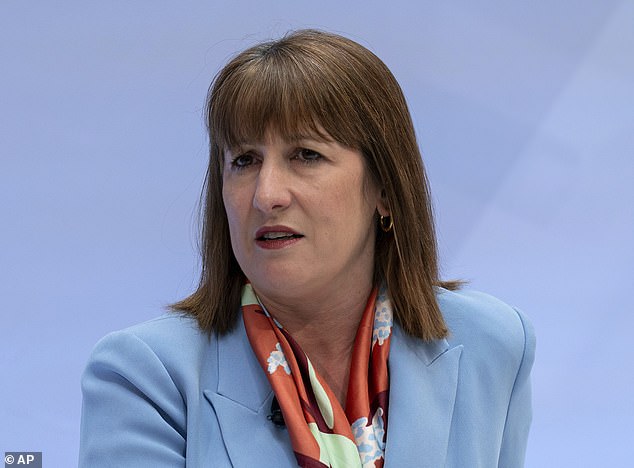Rachel Reeves’ trip to Washington last week caught the headlines over a potential trade deal with the US, her support for Donald Trump’s concerns on global imbalances, plus the inevitable glum forecasts from the International Monetary Fund about the British economy.
But, as far as the Chancellor’s future is concerned, the important – and devastating – news was that the Government’s borrowing is shooting out of control.
It came from the Office for Budget Responsibility. In the financial year just ended the Government borrowed £152 billion. That’s £21 billion more than the year before, which is bad enough.
But, more worrying still, it was £15 billion more than the OBR expected just four weeks ago, at the time of the Spring Statement.
In public finance terms, that may not sound much, but the overshoot is as big as the receipts from inheritance tax and vehicle excise duty together. Each brought in about £8 billion last year.
The reason for this, according to the OBR, is lower-than-expected tax receipts coupled with higher-than-forecast spending.

Talking shop: Commentators say that the Chancellor will either have to increase taxes in her next Budget in the autumn, or cut spending, or borrow yet more
That has led commentators to say that the Chancellor will either have to increase taxes in her next Budget in the autumn, or cut spending, or borrow yet more.
However, in reality she can’t increase tax receipts. She can put up tax rates, but, aside from the impact on the economy, higher rates may not bring in more revenue. That seems to be what is happening at the moment.
She can’t borrow more, or at least were she to try to do so our long-term borrowing rates would shoot up even more. Already the UK pays the highest interest on its national debt of any G7 country. Our key rate, the ten-year gilt yield, is 4.5 per cent. For the US, it’s 4.3 per cent, for Italy 3.6 per cent, France 3.2 per cent, Canada 3.1 per cent, Germany 2.5 per cent and Japan 1.4 per cent.
Reeves has sought to blame her troubles on the previous government, but a year ago, when it was Jeremy Hunt representing the UK at the IMF/World Bank spring meetings, we were paying less to borrow than the US – 4.3 per cent against 4.6 per cent. That’s a brutal comment on her reputation for fiscal management.
The markets don’t go a bundle on how this US administration is handling its finances either, and it was a spike in bond yields that forced Donald Trump to row back on his more extreme positions on tariffs. But they self-evidently trust our Government even less.
So it will have to be spending cuts – on a scale well beyond anything ministers seem to be thinking about now. Can they do it? Well, they can see what not to do. Elon Musk and the US Department of Government Efficiency have failed – quite aside from distracting him from doing something he is good at: running Tesla.
The chainsaw doesn’t work. It has to be the scalpel. The person who in the first instance has to wield it is Reeves’ number two, Chief Secretary to the Treasury Darren Jones. He says all the right things: the need for better financial reporting, spotting overspending early and so on.
The fact the borrowing figures are £15 billion worse than a month ago reveal a systemic problem. But there is a chasm between what minsters say and what they actually do. Remember Reeves’ stuff about this being the most pro-business Government ever?
What we need is a different mindset across government; a rethink not only of how to do things more efficiently but whether to do them at all. An example is that a third of the £1.2 billion spent so far on the Lower Thames Crossing has gone on planning applications – essentially Government departments arguing with each other about the details of the project.
Can this Government really get its collective mind around the scale of the problem it faces?
This isn’t about the detail of the OBR forecasts or fiscal rules. The budget deficit last year was 5.3 per cent of national output. And that’s in what you might call a normal year, with the economy running at close to full capacity and unemployment towards the bottom of its 25-year range.
It’s not sustainable. Something has to give.
DIY INVESTING PLATFORMS

AJ Bell

AJ Bell
Easy investing and ready-made portfolios

Hargreaves Lansdown

Hargreaves Lansdown
Free fund dealing and investment ideas

interactive investor

interactive investor
Flat-fee investing from £4.99 per month

InvestEngine

InvestEngine
Account and trading fee-free ETF investing
Trading 212
Trading 212
Free share dealing and no account fee
Affiliate links: If you take out a product This is Money may earn a commission. These deals are chosen by our editorial team, as we think they are worth highlighting. This does not affect our editorial independence.
This article was originally published by a www.dailymail.co.uk . Read the Original article here. .

